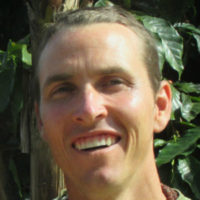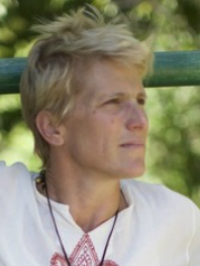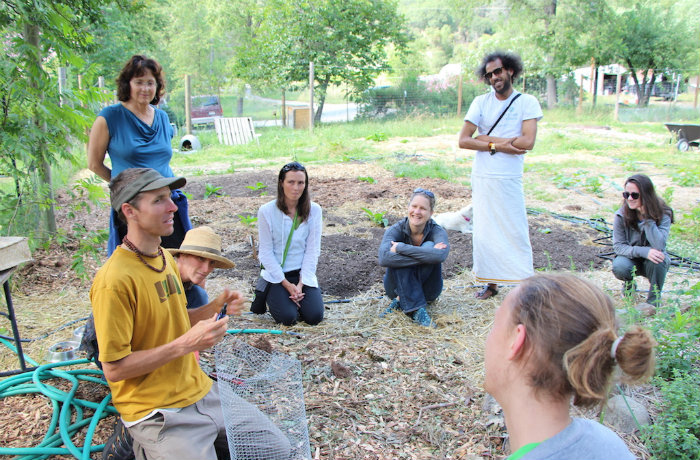Permaculture Design Certification: Part 1
with Spencer Nielsen and Lydia Neilsen
April 15 - 20, 2019
 Description
Description
IMPORTANT NOTE: This is a two-part Permaculture Design Course. You must attend both to receive your Permaculture Design Certificate. Register for Part 2 here.
The course will follow the structure and content of internationally-recognized PDC’s, while adding principles and practices of Yoga and Ayurveda. We will look to the roots of permaculture with Bill Mollison and David Holmgren as well as the application and influence it has had around the world.
The daily rhythm will include participation in the ashram’s meditation, chanting, & satsang, as well as pranayama & asana sessions. Two sattvic meals are provided, between which we will cover theory and practice of permaculture. Each day’s theme will include lecture, discussion, activities, and hands-on application to digest the content in a dynamic way. We will use the wild lands, fruit/nut orchards, gardens, and greenhouse as our classroom. The container of the ashram will provide it’s own education – learning to live in harmony with the daily rhythm of the land and the community. Yoga and Ayurveda will be explored in the context of holistic, regenerative living and will also provide frameworks for exploring permaculture in a Vedic way, such as through the five elements.
Course Content
Earth:
- Soil Science & Soil Food Web
- Fertility management including Composting, Compost tea
- Earthworks
- Natural Building
- Agroforestry and agriculture
- Ayurvedic herbalism – growing and using medicinals
- Bio-remediation
- Carbon sequestration
- Land access
Water:
- Rainwater harvesting
- Grey water design
- Irrigation basics
- Storing water in the landscape
- Aquaculture
- Alternative currencies
Fire:
- Renewable Energy
- Appropriate Technology
- Fire ecology
- Ayurvedic diet and cooking
- Animals in the landscape
Air:
- Site Analysis & Self Analysis (Ayurvedic Doshas, constitution)
- Reading the landscape
- Climatic strategies (Ayurvedic concepts of Desha, land)
- Creating and working with microclimates
- Mapping and map reading
Ether:
- History of Permaculture and it’s roots in traditional cultures worldwide
- Permaculture Ethics & Yoga Ethics: Yama & Niyama
- Permaculture Principles
- Design strategies and Ayurvedic elemental design
- Social permaculture
- Community organizing and governance
- Urban permaculture
- International applications & opportunities
- Permaculture connection to Yoga, Ayurveda, Vastu, Jyotish (Vedic Astrology)
Certification
This is a two-part Permaculture Design Course. You must attend both to receive your Permaculture Design Certificate. This provides you with time in between to study, apply what you learned, and work on your homework (final design projects).
PART 1 will focus on the context of permaculture along with it’s foundations of principles and patterns. We will dive into core subjects such as soil, water, plants, and the basics of design. Students are expected to do some work/study in between courses and will present a final design project at the end of second week (in spring) – also a requisite for graduation.
Schedule
06:00 – 08:00 am Satsang: Silent meditation, chanting and lecture
08:00 – 10:00 am Permaculture Class
10:00 – 10:45 am Brunch
11:00 – 04:00 pm Permaculture Class
04:00 – 06:00 pm Yoga Class
06:00 – 06:45 pm Dinner
08:00 – 10:00 pm Satsang: meditation, chanting and lecture
Instructors
The core instructors have been in collaboration for a decade. They each design ecological gardens and teach permaculture together at the Regenerative Design Institute in Bolinas, CA.
Arrival and Departure
Arrival: Check-in time begins at 2AM on the first date listed above. The course will begin with an orientation at 7pm on the first Date of the course with an Ashram Orientation followed by Satsang at 8pm.
Departure: The course will conclude at 3pm on the Final date.
What to Bring
Slip on shoes, waterproof work boots, work gloves, hat, sunglasses, sunscreen, bug repellent (we recommend organic or essential oil based bug sprays), loose comfortable and durable clothing, writing materials, meditation shawl or blanket, yoga mat, flashlight.
Students will be provided with supplemental reading material in digital form as well as a recommended reading list.
Additional books and materials are available in our boutique.
FAQs
Do I have to complete parts 1 & 2 in the same year?
Yes. You need special permission from the course instructors to complete the course in two separate years. We understand that there may be life circumstances or emergencies, however, we still don’t recommend doing this for a few reasons. For one, there is no guarantee that part 2 of the course will be offered in the second year you want to take it, since it depends on the number of students that register. Secondly, you might find it difficult to retain the information you gained from part 1 and also working on your design project when taking a year or more in between. Finally, it is possible that the curriculum could change, which would potentially leave gaps or have repeat lessons.
Having a two-part course is actually a unique offering that students appreciate. It gives you time to take a break from the intensive course, allows more study time and plenty of time to work on required design projects.Design project work is often squeezed into other intensive two-week PDC’s on top of 7-8 hours of daily class time.
Are meals included in the course?
Yes. Two high quality organic vegetarian meals are provided daily. It is served buffet style, so you are welcome to take a little extra for an afternoon snack. You are also welcome to bring your own snacks, but please follow the Ashram dietary guidelines. We have a shared student fridge available for storing food. Our boutique sells various vegan, gluten-free, organic and/or fair-trade snacks and beverages.
Can you accommodate special diet needs or food allergies?
We follow a strict yogic lacto-vegetarian diet at the Ashram. We never serve eggs, garlic, onion, mushrooms or meat. Dairy (i.e milk, cheese or yogurt) is served separately on occasion and is sometimes included in our dishes. Our meals always have vegan options (including a salad bar). We usually have wheat-free options as well, but we cannot guarantee suitable conditions for severe gluten intolerance or people with celiac disease. We cannot guarantee suitable meals for people with dietary restrictions, extreme food or nut allergies, although we rarely use nuts in our cooking.
Can I commute to the course?
We recommend staying at the ashram to gain the full experience and immersion in Yoga life, however, we understand it is not always possible for people. Please email us at yogafarmregistrations@yogafarm.org to ask for permission to commute. If approved, commuters are still asked to attend both morning and evening Satsang and one yoga class per day.
Do you offer scholarships and/or work trade?
Scholarships are not always available but sometimes discounts are offered on a case-by-case basis, contingent upon approval from the course instructors and the directors of the Ashram. Email yogafarmregistrations@yogafarm.org with your reason for requesting a scholarship. We may ask for supporting financial documents and references.
We do not offer “word-trade” per se, but if you are interested in serving at the Yoga Farm you can fill out the Seva Study or Karma Yoga application. You can specify that you are interested in the Permaculture Design Course on the application. You may still be responsible for course tuition even if you are a volunteer. We recommend putting down your deposit for the PDC to secure your spot.
Have more questions?
Email us at yogafarmregistrations@yogafarm.org or call us at 530-272-9322.
About the Teachers

Spencer Nielsen
Spencer Nielsen is a guide to Nature inside and out, in the wild lands, gardens, and consciousness. He is a permaculture designer and educator based in Fairfax, California. He has studied Ecology, Environmental Education, and Eco-Social Design, as well as Permaculture, Yoga, Qigong, Ayurveda, Daoist medicine, and Planetary Herbalism. With over a decade of experience […]
Learn more about Spencer Nielsen
Lydia Neilsen
Through her business Rehydrate the Earth, Lydia Neilsen works on a practical and consciousness-based level to teach and implement techniques for ecosystem revitalization. Lydia educates individuals and communities in the creation of stunning regenerative designs including do-it-yourself scale earthworks for water infiltration, productive water conserving polyculture landscapes, soil building, greywater and other Earth healing strategies. She listens to […]
Learn more about Lydia NeilsenCategories : pdc, Permaculture

